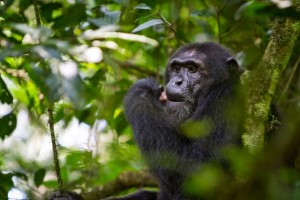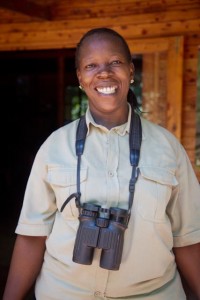The Thrill of the Hunt: Tracking Chimps in the Ugandan Rainforest
 After 17 years of working with chimpanzees at the Kaniyo Pabidi eco-tourism site, forest ranger Sauda Birungi knows a lot about their behavior, which makes tracking them in Uganda’s Budongo Forest easier.
After 17 years of working with chimpanzees at the Kaniyo Pabidi eco-tourism site, forest ranger Sauda Birungi knows a lot about their behavior, which makes tracking them in Uganda’s Budongo Forest easier.
“Sometimes people think they have moved, but they are really staying quiet until the threat has passed,” she says to me and my traveling companion.
At the moment, that threat is us. Our presence could foil the chimpanzees’ plan to hunt for colobus monkey, an activity undertaken only a few times a year. Minutes after we set off along the trail to track the animals, Birungi knew this wasn’t a regular day of foraging leaves and fruit. The troop had divided into several hunting parties to surround their prey, but now the call of a baboon in the area has announced to the other primates that we are lurking.
“Let’s sit here for a bit,” says Birungi as she takes a seat on a fallen tree trunk. It may look like she is resting, but her Sherlock Holmes-like senses are attuned to the sounds of the forest, which will provide clues to where the chimps are hiding in the dense foliage. Ten minutes pass before we hear a snap of a twig and a faint grunt.
We set off along the trail dotted with seeds from the tasty red fruit called Uvariopsis congensis, which is dispersed in chimpanzee dung. Their hoots and hollers indicate we’re close and our adrenaline is pumping. While we can’t see the chimps yet, we head off the trail toward a cluster of trees waving back and forth accompanied by the sounds of blood-curling screams and thumps.
We catch up with the troop just as they have snatched a young colobus from its mother. The chimps are screaming, excited that the hunt has been successful. Joe, the chimp that made the kill, has climbed a tree to have his meal, while the other chimps beg him to share. Jemma, a female in heat, cries out to him.
“She us willing to trade sex for food,” says Birungi. But Joe isn’t interested. This is the first time in months he’s eaten meat — and the three of us get to witness it.
“This is a very special day for you,” the guide adds. “Most visitors never see the chimps hunting.”
Kaniyo Pabidi provides up-close interaction with chimpanzees for $60. The price includes a four-hour guided walk and a chance to see our closest relatives in the wild. Only 24 people per day can participate and a sighting is not guaranteed. In fact, the other groups that were tracking in the forest this morning will leave disappointed — our guide’s walkie-talkie stopped working before she could radio our location.
Up until three years ago, the ecotourism site was a research center operated by the Jane Goodall Institute. While the nonprofit’s namesake did her famous chimp studies in Tanzania, the organization funds various projects throughout the world that focus on human and chimpanzee interaction and habitat conservation.
The more than 800 chimpanzees in the Budongo Forest have lived in close proximity with human settlements in the area with little trouble. However, our local driver, Sam Byabasaija, previously told us a story about an encounter with the primates that took place in his village.
A chimpanzee snatched a baby from a woman washing in a stream. Distraught, she followed the chimp, which was high up in a tree with her child. She begged the animal to bring her baby back and eventually it climbed down to the base of the tree and left the child there relatively unscathed.
 Birungi says not all of the stories have a happy ending. Chimp babies cling to their mothers, but human babies are helpless. Another abduction ended in tragedy when the baby fell to its death a few years ago when it didn’t “hold on.”
Birungi says not all of the stories have a happy ending. Chimp babies cling to their mothers, but human babies are helpless. Another abduction ended in tragedy when the baby fell to its death a few years ago when it didn’t “hold on.”
These incidents are rare, thought to be the result of habit destruction by humans, but for the most part Ugandans have a harmonious relationship with the primates. Our guide is proof of that. She credits the chimps for saving her life when she had a close encounter with a python a few years ago. The chimps screamed a warning to her as she approached the snake thinking it was dead. She escaped just as it uncoiled and began to chase her.
“I know they were trying to tell me something,” she says.
Right now they are clearly settling down to nap after their busy morning. We felt lucky to have seen the chimps on this day. The chimps may be fully satiated, but the thrill of the hunt still lingers on for us.
___________________________________________
Make reservations for chimp tracking through the Budongo Eco Lodge, which also provides accommodations at the facility. Cabins are $80 with full board. Dorms cost $40 with full board. www.ugandalodges.com/lodges/budongo/

Write a Reply or Comment